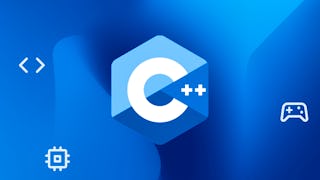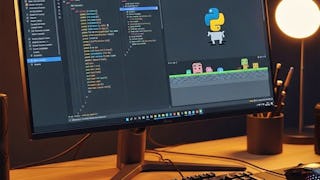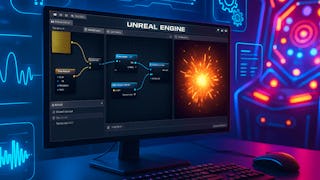- Browse
- Opengl
Opengl Courses
OpenGL courses can help you learn graphics programming, rendering techniques, shading languages, and real-time 3D graphics. You can build skills in texture mapping, lighting models, and optimizing performance for graphics applications. Many courses introduce tools like GLFW for window management, GLEW for OpenGL extension wrangling, and shaders written in GLSL, allowing you to create visually stunning graphics and interactive experiences.
Popular Opengl Courses and Certifications
 Status: Free TrialFree TrialJ
Status: Free TrialFree TrialJJohns Hopkins University
Skills you'll gain: Artificial Neural Networks, Image Analysis, Event-Driven Programming, Scalability, Deep Learning, C and C++, Performance Tuning, Convolutional Neural Networks, Data-oriented programming, C++ (Programming Language), Digital Signal Processing, Linear Algebra, Distributed Computing, Computer Graphics, System Programming, Mathematical Software, Numerical Analysis, Programming Principles, Computer Architecture, Machine Learning
Build toward a degree
2.8·Rating, 2.8 out of 5 stars188 reviewsIntermediate · Specialization · 3 - 6 Months
 Status: Free TrialFree TrialI
Status: Free TrialFree TrialIImperial College London
Skills you'll gain: Logo Design, Computer Graphics, Visualization (Computer Graphics), 3D Assets, Android Development, Augmented and Virtual Reality (AR/VR), Android Studio, Computer Graphic Techniques, Animations
4.5·Rating, 4.5 out of 5 stars45 reviewsIntermediate · Course · 1 - 4 Weeks
 Status: Free TrialFree TrialU
Status: Free TrialFree TrialUUniversity of Colorado System
Skills you'll gain: Unreal Engine, Object Oriented Programming (OOP), File I/O, C++ (Programming Language), Object Oriented Design, Debugging, Computer Programming, Event-Driven Programming, Video Game Development, Unity Engine, Data Structures, C# (Programming Language), Data Storage, 3D Assets, Development Environment, Game Design, Software Documentation, Program Development, Software Design Patterns, User Interface (UI)
4.5·Rating, 4.5 out of 5 stars211 reviewsIntermediate · Specialization · 3 - 6 Months
 Status: Free TrialFree TrialU
Status: Free TrialFree TrialUUniversity of Toronto
Skills you'll gain: Computer Vision, Convolutional Neural Networks, Image Analysis, Control Systems, Robotics, Embedded Software, Automation, Deep Learning, Software Architecture, Simulations, Safety Assurance, Traffic Flow Optimization, Artificial Neural Networks, Global Positioning Systems, Machine Controls, Hardware Architecture, Systems Architecture, Network Routing, Estimation, Machine Learning Methods
4.7·Rating, 4.7 out of 5 stars3.5K reviewsAdvanced · Specialization · 3 - 6 Months
 Status: NewNewStatus: Free TrialFree Trial
Status: NewNewStatus: Free TrialFree TrialSkills you'll gain: Animation and Game Design, Video Game Development, 3D Assets, Event-Driven Programming, Animations, Game Design, Graphics Software, Computer Graphics, Visualization (Computer Graphics), Interactive Design, Computer Graphic Techniques, User Interface (UI), User Interface (UI) Design, UI Components, Program Development, Python Programming, Application Design, Development Environment, Debugging, Development Testing
Beginner · Specialization · 1 - 3 Months
 Status: NewNewStatus: Free TrialFree Trial
Status: NewNewStatus: Free TrialFree TrialSkills you'll gain: Unreal Engine, Performance Tuning, Game Design, User Interface (UI), Video Game Development, 3D Assets, Virtual Environment, Virtual Reality, Animations, Simulations, Computer Graphics, Animation and Game Design, Augmented and Virtual Reality (AR/VR), Scripting, Interactive Design
Intermediate · Specialization · 3 - 6 Months
What brings you to Coursera today?
 Status: Free TrialFree TrialU
Status: Free TrialFree TrialUUniversity of Toronto
Skills you'll gain: Control Systems, Robotics, Embedded Software, Automation, Software Architecture, Simulations, Safety Assurance, Hardware Architecture, Systems Architecture, Computer Vision, Mathematical Modeling, Safety Standards, Global Positioning Systems
4.7·Rating, 4.7 out of 5 stars2.9K reviewsAdvanced · Course · 1 - 3 Months
 Status: Free TrialFree TrialI
Status: Free TrialFree TrialIIndian Institute of Technology Guwahati
Skills you'll gain: SolidWorks (CAD), Computer-Aided Design, Computer Graphics, 3D Modeling, Mechanical Design, Engineering Drawings, Visualization (Computer Graphics), Prototyping, Animations
4.1·Rating, 4.1 out of 5 stars11 reviewsIntermediate · Course · 1 - 3 Months
 Status: PreviewPreviewT
Status: PreviewPreviewTThe University of Tokyo
Skills you'll gain: Visualization (Computer Graphics), Interactive Design, Computer Graphics, Computer Graphic Techniques, Human Computer Interaction, Animation and Game Design, User Interface (UI), Robotics, 3D Assets, Algorithms, Simulations
4·Rating, 4 out of 5 stars316 reviewsIntermediate · Course · 1 - 3 Months
 Status: NewNewStatus: Free TrialFree Trial
Status: NewNewStatus: Free TrialFree TrialSkills you'll gain: Unity Engine, Animation and Game Design, Video Game Development, Data Structures, Game Design, Computer Graphics, Trigonometry, Linear Algebra, Advanced Mathematics, Applied Mathematics, Algorithms, General Mathematics
Advanced · Course · 1 - 4 Weeks
 Status: NewNewStatus: Free TrialFree Trial
Status: NewNewStatus: Free TrialFree TrialSkills you'll gain: Animation and Game Design
Intermediate · Course · 1 - 4 Weeks
 Status: Free TrialFree TrialI
Status: Free TrialFree TrialIImperial College London
Skills you'll gain: Virtual Reality, Augmented and Virtual Reality (AR/VR), Computer Graphics, Virtual Environment, Logo Design, 3D Assets, Android Development, Visualization (Computer Graphics), Computer Graphic Techniques, Android Studio, Application Development, Animation and Game Design, Animations, Interaction Design
4.3·Rating, 4.3 out of 5 stars131 reviewsIntermediate · Specialization · 3 - 6 Months
What brings you to Coursera today?
Searches related to opengl
In summary, here are 10 of our most popular opengl courses
- GPU Programming: Johns Hopkins University
- Android Graphics with OpenGL ES: Imperial College London
- C++ Programming for Unreal Game Development: University of Colorado System
- Self-Driving Cars: University of Toronto
- Game Mechanics with Python and Pygame: EDUCBA
- Unreal Engine Visual FX, Materials & Interactive Systems: EDUCBA
- Introduction to Self-Driving Cars: University of Toronto
- Computer Aided Design: Indian Institute of Technology Guwahati
- Interactive Computer Graphics: The University of Tokyo
- Advanced Game Math - Affine Transformations: Packt
Frequently Asked Questions about Opengl
OpenGL, or Open Graphics Library, is a cross-platform application programming interface (API) used for rendering 2D and 3D vector graphics. It is essential for developing graphics-intensive applications, including video games, simulations, and visual effects in films. OpenGL provides a set of functions that allow developers to create high-performance graphics applications, making it a fundamental tool in the fields of computer graphics and game development.
With skills in OpenGL, you can pursue various job roles, including graphics programmer, game developer, software engineer, and 3D artist. These positions often require a strong understanding of computer graphics principles and the ability to implement them using OpenGL. Industries such as gaming, virtual reality, and simulation training are particularly in need of professionals skilled in OpenGL.
To learn OpenGL effectively, you should focus on several key skills. These include a solid understanding of computer graphics concepts, proficiency in programming languages such as C++ or Python, and familiarity with mathematics, particularly linear algebra and geometry. Additionally, knowledge of shader programming and rendering techniques will enhance your capabilities in creating visually appealing graphics.
Some of the best online courses for learning OpenGL include practical, hands-on programs that guide you through the fundamentals and advanced topics. For instance, the Android Graphics with OpenGL ES course offers insights into using OpenGL ES for mobile applications, making it a great choice for aspiring mobile developers.
Yes. You can start learning OpenGL on Coursera for free in two ways:
- Preview the first module of many OpenGL courses at no cost. This includes video lessons, readings, graded assignments, and Coursera Coach (where available).
- Start a 7-day free trial for Specializations or Coursera Plus. This gives you full access to all course content across eligible programs within the timeframe of your trial.
If you want to keep learning, earn a certificate in OpenGL, or unlock full course access after the preview or trial, you can upgrade or apply for financial aid.
To learn OpenGL, start by familiarizing yourself with the basics of computer graphics and the OpenGL API. You can find numerous online resources, including tutorials and courses. Begin with simple projects to apply what you learn, gradually increasing complexity as you become more comfortable. Engaging in community forums and collaborating with others can also enhance your learning experience.
OpenGL courses typically cover a range of topics, including the basics of rendering, 3D transformations, lighting and shading techniques, texture mapping, and shader programming. Advanced courses may also explore optimization techniques and real-time rendering, providing a comprehensive understanding of how to create high-quality graphics.
For training and upskilling employees in OpenGL, look for courses that offer practical, project-based learning. These courses should focus on real-world applications of OpenGL in graphics programming and game development. Engaging with programs that include hands-on projects can significantly enhance the learning experience and prepare employees for immediate application of their skills in the workplace.










